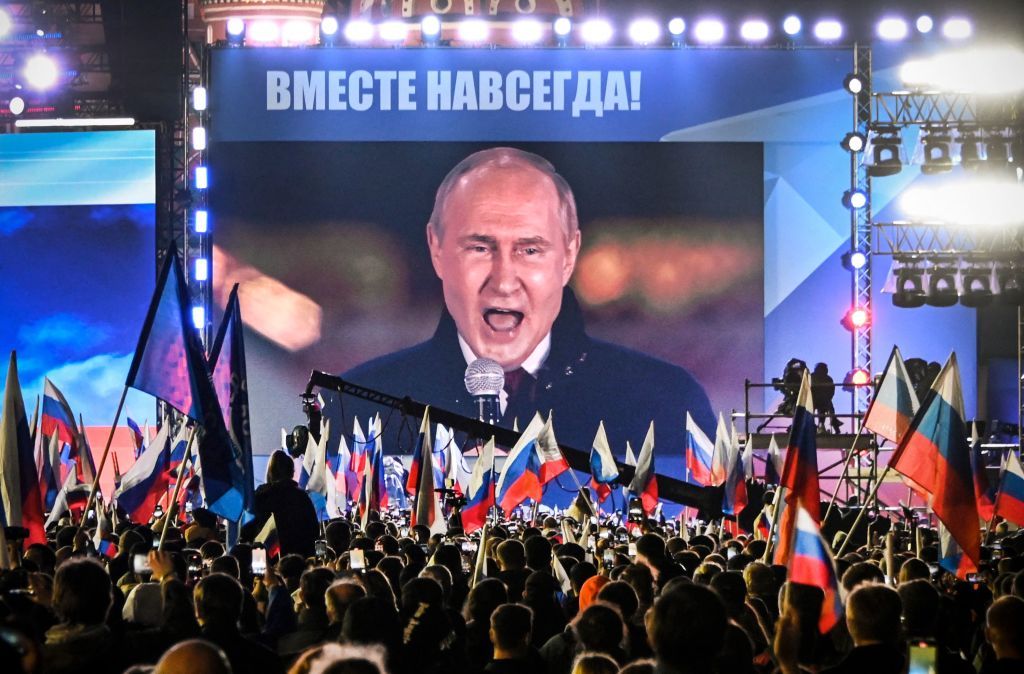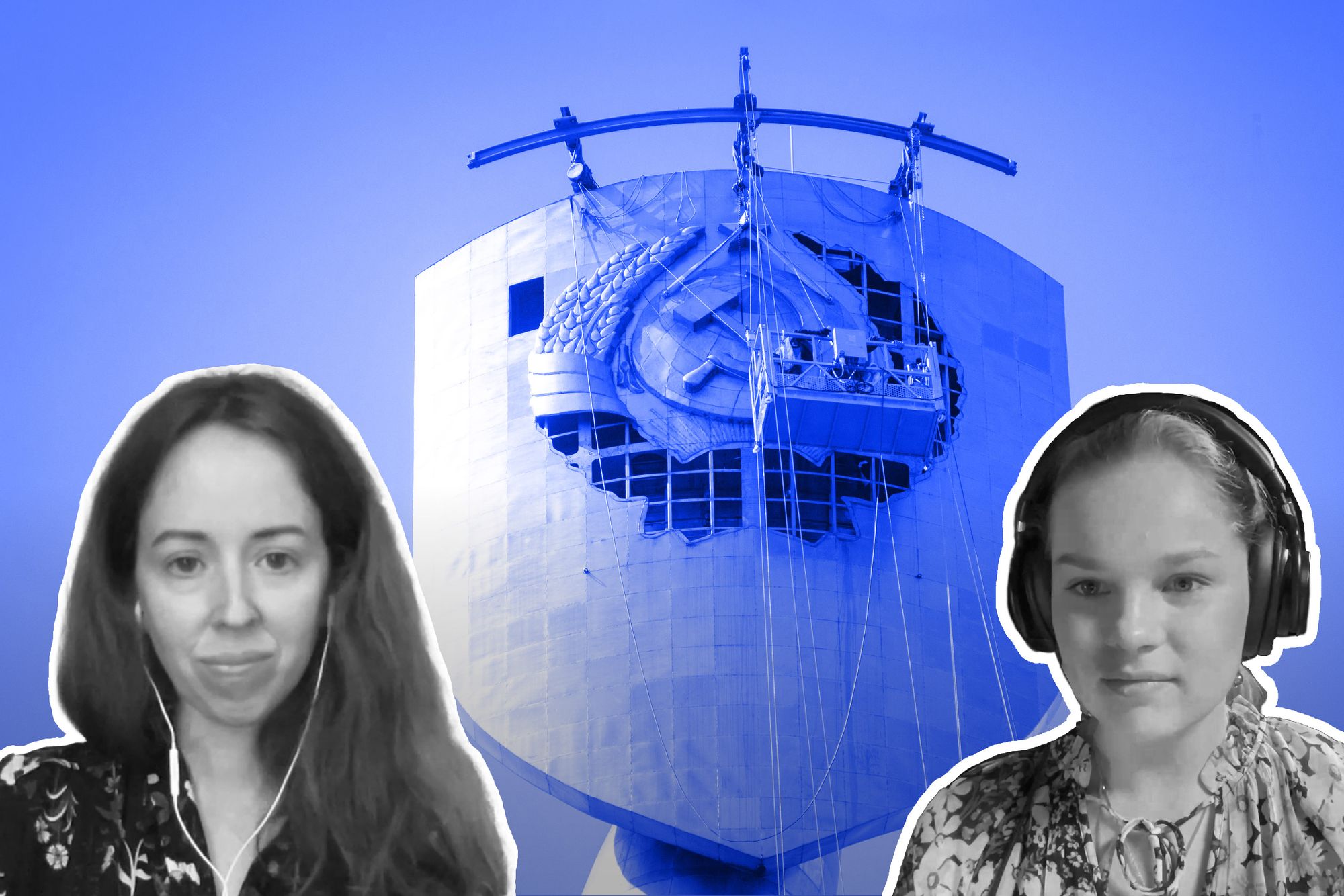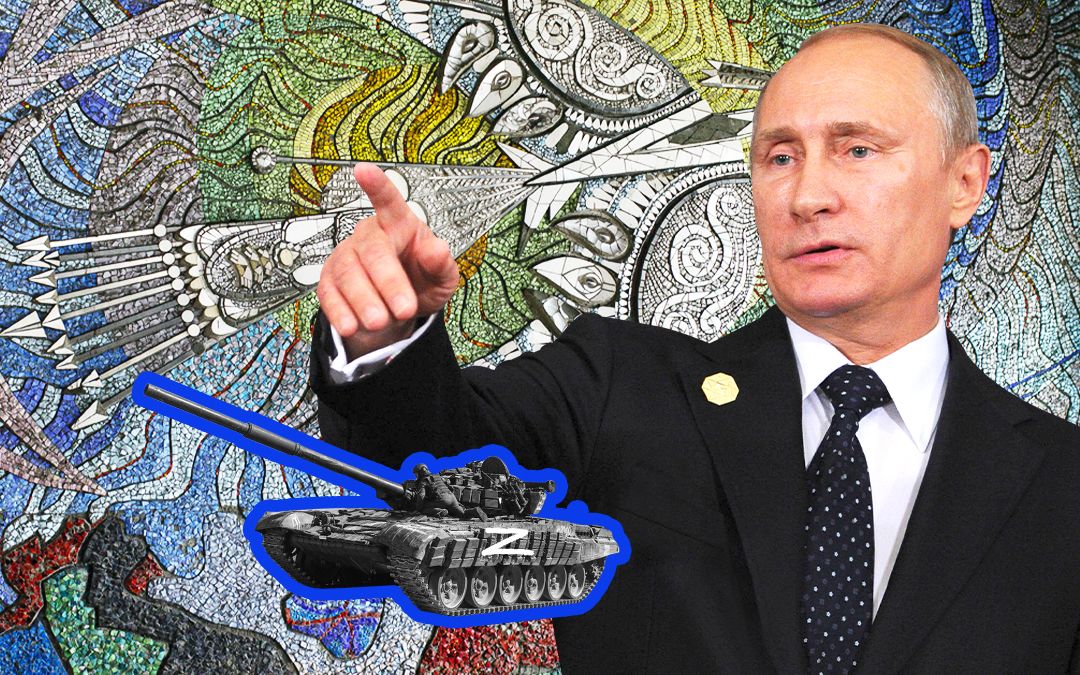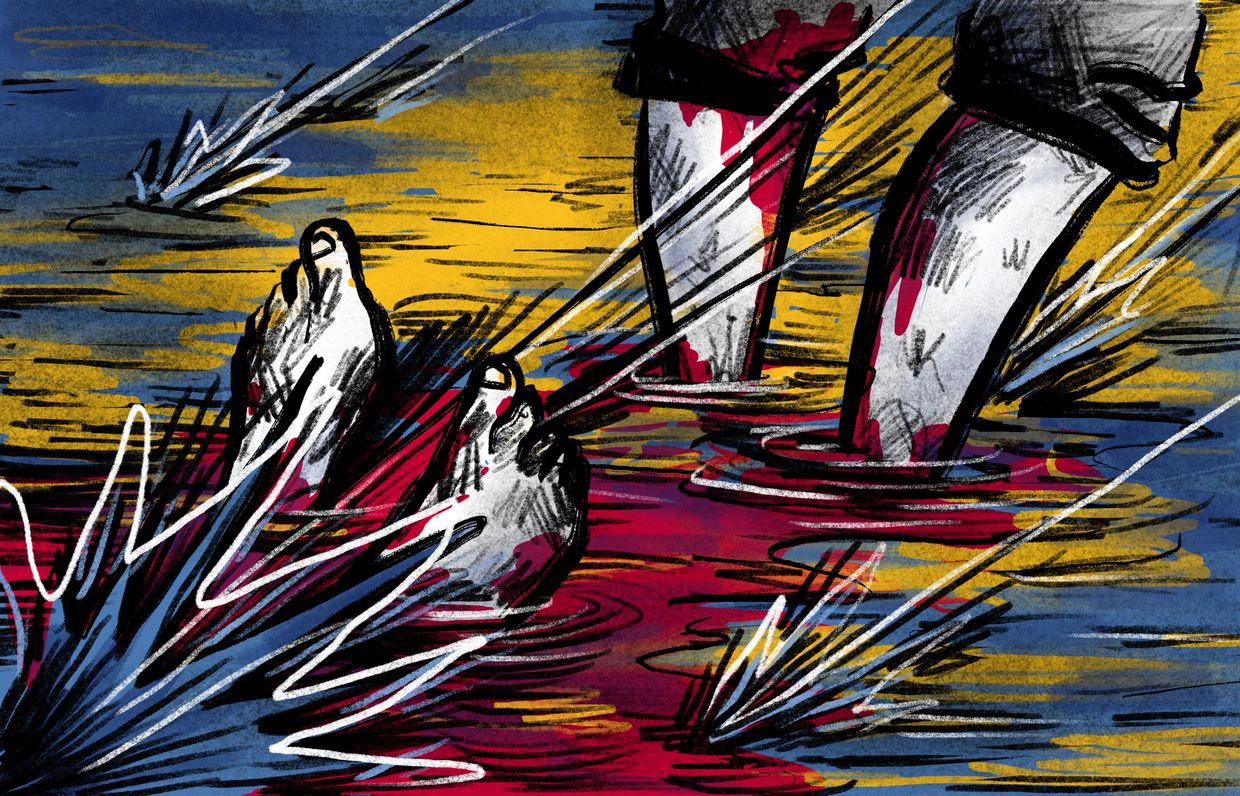Philosopher Jason Stanley: 'Russia is explicitly fascist'

Eighteen months into Russia's all-out war against Ukraine, which left tens of thousands of people dead, many more injured, and entire regions destroyed, observers still lack the vocabulary to adequately describe Moscow's actions.
Jason Stanley, professor of philosophy at Yale University and author of "How Fascism Works," visited Kyiv in early August to talk about the history of fascism, colonialism, and the roots of Russia's ongoing war.
"Ukraine has been the victim of Soviet genocide, and the Russian Empire has, for centuries, directed itself toward the domination of Ukraine," Stanley told the Kyiv Independent.
"Right now, Russia is explicitly fascist and plans a violent colonial territorial expansion," he added.
The Kyiv Independent spoke with Stanley on the intersection between fascism and colonialism and how Russia employs both in its war against Ukraine.
The following interview has been edited for clarity.
The Kyiv Independent: You are in Ukraine to teach a class on fascism and colonialism. These themes are regularly discussed and debated in Kyiv today. But beyond contributing to a current debate, what motivated you to visit Ukraine at this particular moment in history?
Jason Stanley: I am an anti-fascist and an anti-imperialist. Ukraine is being invaded by a violent fascist regime. Russia aims to extend its history of colonization of its neighboor in an openly genocidal fashion.
I am the child of two Holocaust survivors. Given who I am as a philosopher, as well as my personal history, it was obvious that I should visit Ukraine at this pivotal moment in history. I needed to learn from Ukrainians about how they face these threats and use that knowledge and my platform to help Ukraine win.
In your book, "How Fascism Works," you say fascism is not a historical phenomenon that is uniquely bound up with Hitler and Mussolini. Instead, you suggest fascism is a political phenomenon that could appear in any country. With that said, can you describe the basic features of fascism?
Fascism arises as a violent social and political movement that mobilizes its supporters against liberal democracy by myths of past military greatness, and subsequent loss and grievance about that loss, caused by liberalism.
It is characteristically led by a charismatic leader, who promises revenge for various national humiliations. Its violent militias, sometimes penetrating some of the state’s official organizations, create chaos that the movement itself promises to solve, by authoritarian
solutions, like “law and order.”
It is committed to strict gender roles, and represents national minorities and sexual minorities as fundamental threats empowered by democracy’s freedoms. Such movements are backed by elite oligarchs, who hope to profit from it, and they are directed against
cultural and intellectual elites.
Fascist movements provide joy to their supporters by unifying them in a movement with a purpose, to take revenge for various putative humiliations to the dominant group.
Since fascism consists of a set of political traits that may be present in any political system, can you provide some examples of fascism at work in a liberal democracy?
In the Weimar Republic, the National Socialist Party arose as an electoral force at the polls over several years, in part by moderating its originally extreme message. The Nazis were successful in masking Hitler’s extreme aims, laid out in his 1925 work "Mein Kampf."
German voters thought either that Hitler himself had moderated, or that his previous words were merely rhetoric. There have been many fascist movements in liberal democracies over the years, for example, the British Fascist Party.
Following Toni Morrison, I tend to think in the first instance of fascist practices rather than fascist social and political movements or fascist regimes. Here, it is much more obvious that liberal democracies can co-exist alongside fascism, insofar as formal liberal democracies can engage in various fascist practices – such as violent militias, military style policing, harsh treatment of national minorities, etc.
Needless to say, some of these fascist practices are present in America today.

Like fascism, colonialism is often associated with a specific time-period, say, Athenian dominance of the Aegean in the 5th Century BCE or European conquest of Asia, Africa, and the Americas in the 18th and 19th Centuries. But do you also treat colonialism as primarily a political phenomenon? And if so, what are the defining features of colonialism?
Colonialism, like fascism, should be thought of in terms of its practices, its institutions, and its culture.
At its most basic level, it is the violent domination of a country or a people with less resources by a country or a people with more resources, so we can even speak of internal
colonialism.
Colonialism characteristically involves the seizure of territory, including moving the colonized population off desirable territory, and into camps or reserves, and essentially or literally enslaving them.
Some of the paradigm colonialist institutions overlap with fascist ones – the concentration camp, for instance.
The culture of colonialism involves harsh treatment of the colonized. Colonized people are often seen as worthless, or at best as tools for exploitation – as Cesaire writes, “colonization is thingification.”
There are also cognitive practices of colonialist domination. Using the education system, colonial powers erase the colonial population’s history, identity, and language, replacing it with their own. These are general characterizations, and no two colonial situations are exactly the same.
Colonial powers, whether in Ancient Greece or Modern Europe, were often democracies. This suggests that colonialism and fascism are distinct political formations. So, I wonder if you can explain the connection you see between colonialism and fascism?
In Book III of Thucydides’ "History of the Peloponnesian War," Cleon argues that the entire
population of Mytilene should be murdered for their anti-colonial rebellion against Athens.
What prevents Athens from taking such steps, Cleon claims, is its democratic culture, which prevents Athens from being the kind of ruthless empire Cleon urges it should be. A true democracy, according to Cleon, is not capable of the brutality required to be an effective empire.
Though I disagree with Cleon about which of these two options Athens should choose, Cleon is right about this point.
Colonizing involves dominating a group by subjecting them to fascist practices – concentration camps, mass rape, forced labor, elimination of history.
According to Aimé Césaire’s “boomerang” thesis, colonialism abroad invariably leads to fascism at home.
I think this is problematic as a general thesis – Belgium’s brutal colonization of the Congo, involving the murder of 10 million Congolese, led to great wealth and a successful democracy for those who profited from it.
But I think a lot of the brutality you see in, for example, American culture, is due to our history of violent domination, both inside and outside our current borders. Put otherwise, fascism abroad or towards a national minority at home is colonialism.
Colonialism does not always lead to fascism, but it can easily corrupt the political culture of the colonizing nation in the direction of fascism.
Conversely, all fascist regimes are explicitly violently colonialist, and they often draw inspiration from violent colonialism of the past. All you need to do is read the second to last chapter of Hitler’s "Mein Kampf," where he lays out his plan for territorial expansion in the east.
Here Hitler’s colonial ambitions are informed by his understanding of manifest destiny in the United States – the view that white settlers were destined to expand the nation westward towards the Pacific Ocean.

As I mentioned at the outset, fascism and colonialism are often discussed in Kyiv today, but can you use your particular analysis of these phenomena to explain Russia’s invasion of Ukraine?
My accounts of fascism and colonialism apply directly to Russia’s invasion of Ukraine.
Russia has long had a colonial relationship with Ukraine. My time in Ukraine has only solidified my belief that Oleksiy Radynski’s particular analysis of the relationship between Russia and Ukraine is correct.
Russia is the metropole and Ukraine the colony.
Ukraine’s intellectual class has gone to Moscow for university and Ukraine’s writers and intellectuals have written in Russian and largely directed themselves to a Russian audience. Ukraine has been the victim of Soviet genocide, and the Russian Empire has, for centuries, directed itself towards the domination of Ukraine.
Right now, Russia is explicitly fascist, and plans a violent colonial territorial expansion.
Since no two colonial situations are exactly the same, the particularities of this explicitly fascist colonial war differ somewhat from, say, British colonialism or Soviet colonialism.
First, in these latter cases, colonial violence took place under the guise of “civilizing” the colonial territories, or in the case of the Soviet Union, bringing them under the umbrella of communism.
Putin’s Russia is a fascist regime, and has no such pretenses.
Secondly, Russian colonialism does not view Ukrainians as savages who need to be made
Russian to “civilize” them. According to the ideology of this Russian fascist regime, Ukrainians are already Russian, and Ukrainian identity is a fake construct that is in essence simply hatred of Russians. So, Ukrainian identity must be eliminated for Russia to be great again.
This is an explicitly genocidal agenda, akin to but not quite identical with Hitler’s attitude towards the Jewish people.
What have you learned during your visit to Ukraine?
I have learned that Ukrainians are deeply democratic – they do not wish to live under politicians whom they cannot vote out. There is a deep commitment to a “throw the bums out” mentality.
The democratic spirit is also present in the Ukrainian leadership’s attitude towards human life. Ukrainian leaders see every Ukrainian life as valuable. This strongly influences Ukrainian military policy, and the respect Ukrainians have for their soldiers.
Russia’s fascist rulers, in contrast, have little respect for human life, and they treat their own soldiers as utterly expendable. I have learned that there are prominent non-white Ukrainian patriots, who are refugees from other lands. All of this is good for Ukraine.
I have also learned that Ukrainians can fail to be self-critical of their own past in ways that threaten their democratic future.
A healthy democracy confronts its past. I have heard from Ukrainians that Ukrainians who worked for the Soviet Union were always forced to do so.
Most disturbingly, I have heard defenses of Ukrainian nationalists of the sort who allied with the Nazis, and even participated in the slaughter of Ukrainian Jews and Poles. None of this is acceptable.
All of this is bad for Ukraine.
In my final analysis, Ukraine is capturing the world’s attention by standing up to a violent fascist and colonial regime that has more resources and no limits to its brutality.
The road ahead is hard.
There are two wars, first on the battlefield and then the peaceful transition to a democratic future. Ukraine must win both wars, for itself and the world.














